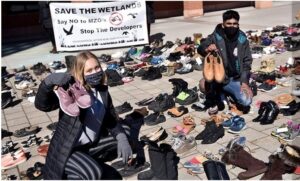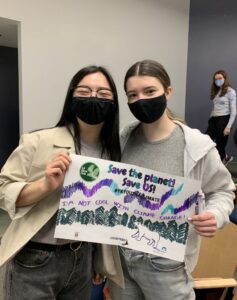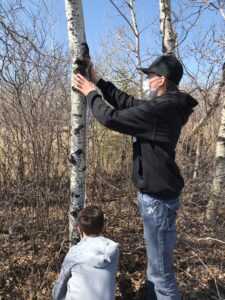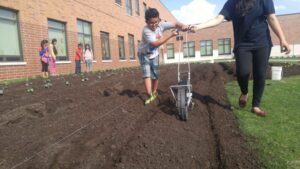Empowering Learners in a Warming World: Youth Climate Action

Projects Sponsor
Empowering Learners in a Warming World: LSF Encourages Youth Climate Action
Leading teachers and students in discussion around local climate, water and sustainability issues is an investment in all our futures.
Fortunately, since 1999, Learning for a Sustainable Future (LSF) has been holding their Youth Forums, events that are designed to engage Canadian teachers and students around sustainability issues, while helping empower them to take positive action to fight climate change.
These forums have been held as full-day, in-person experiences but that changed in the 20/21 school year when the LSF team was of course forced to adapt to a new COVID-19 reality and adapted the hell out of the situation.

With teachers and students across the country uncertain about how they would be teaching and learning in the months to come, LSF understood that they would have to reconfigure their traditional events so that they would be accessible to students who were learning in the classroom, or online from home, or some combination of both.
Skipping a year was out of the question. There’s both a need and a desire for more climate change education, as a 2019 LSF survey (done in partnership with Lakehead University) showed.

Their “Canada, Climate Change and Education” survey of over 3,000 Canadians designed to assess their knowledge and understanding of climate change and their perspectives on the importance of climate change and its risks; their views on the role of schools and climate change education was revealing. The report revealed that Canadians are deeply concerned about climate change and want more education about the issue, both inside and outside of schools. Schools and curricula, the study revealed, are falling short of Canadians’ expectations for learning about climate change; 43% of respondents failed the climate change knowledge test included in the survey.
However, only 32% of educators indicated that they have the necessary knowledge and skills to teach about climate change, saying they need more professional development, classroom resources, current climate science information, etc.
In addition, 43% of students 12-18 were categorized as “aware,” meaning they understand that human-caused climate change is happening but they do not believe that efforts to mitigate it will be effective. This makes them a key group to target with climate change education and action to assuage their eco-anxiety.
Obviously, not holding the Youth Forum would have left a gap in children’s education, so LSF went virtual instead, which was not as simple as it sounds.

Creating a multi-component virtual events series from scratch in just a few months (and on a small budget) is no easy task. Especially with a wide range of needs to address: school board privacy policies, teachers who are new to technology and virtual learning, events covering multiple time zones and a myriad of school schedules, while some students were learning from home. But the LSF team pulled it off!
Using only free or low-cost tools, they looked for ways to preserve the most important elements from the in-person Youth Forums and bring them online. Teachers still received professional development sessions based on LSF’s latest climate change learning resource, “Empowering Learners in a Warming World” available at climatelearning.ca.
LSF worked to maintain the interactive, hands-on nature of the workshops, the sense of community and connection among teachers and students from different schools, and the focus on and support for student action that was key to the transition to online Forums.

Traditionally, students had attended informative and skill-building workshops facilitated by expert organizations, including a LSF-run workshop to help them plan a sustainability Action Project—and they had done that in person, not in pyjamas from their rooms.
These workshops, which help students identify areas of need in their communities and work to make positive impacts, are a crucial part of the Forums. They lay the groundwork for the important Action Projects that take place after the Forum workshops have concluded. Amazingly, none of this was sacrificed in the online environment, and much was gained in terms of reach.

The virtual events dramatically increased LSF’s audience and geographic reach and managed to meaningfully engage students during this challenging year. Ultimately, 17,600 students, across all thirteen provinces and territories, had the opportunity to contribute to the fight against climate change by participating in an Action Project.
At a time when students were understandably anxious, distracted, perhaps feeling a bit hopeless, the Learning for a Sustainable Future program caught their attention, fired-up their eco-imaginations, even.
As one Ontario teacher put it, “My all-virtual class was a real challenge this year. Students were not themselves—disengaged, overwhelmed, and underperforming. But the one thing they did care about this year was their Action Project.”













